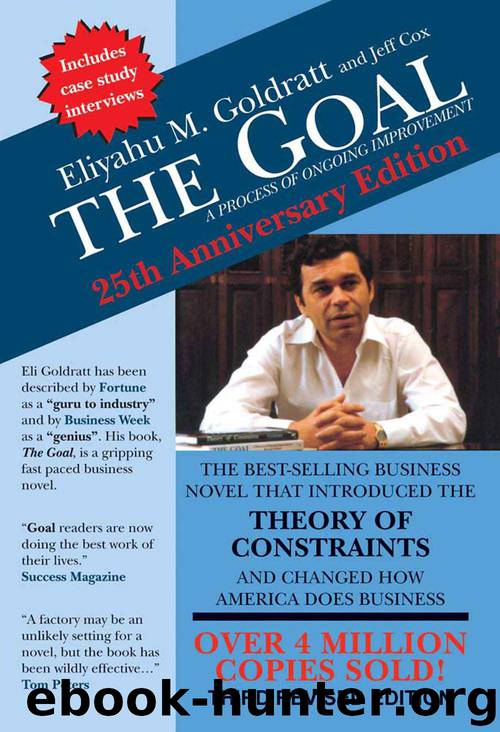The Goal: A Process of Ongoing Improvement by Eliyahu M. Goldratt & Jeff Cox

Author:Eliyahu M. Goldratt & Jeff Cox [Goldratt, Eliyahu M.]
Language: eng
Format: mobi
ISBN: 9780884272588
Publisher: North River Press
Published: 2004-06-30T14:00:00+00:00
1) Y → X 3) Y → A 4) Y → PRODUCT A
X → S X → PRODUCT B
2) X → Y S
E
M
B
L
Y
Jonah says, “We’ve examined four linear combinations involving X and Y. Now, of course, we can create endless combinations of X and Y. But the four in front of us are fundamental enough that we don’t have to go any further. Because if we use these like building blocks, we can represent any manufacturing situation. We don’t have to look at trillions of combinations of X and Y to find what is universally true in all of them; we can generalize the truth simply by identifying what happens in each of these four cases. Can you tell me what you have noticed to be similar in all of them?”
Stacey points out immediately that in no case does Y ever determine throughput for the system. Whenever it’s possible to activate Y above the level of X, doing so results only in excess inventory, not in greater throughput.
“Yes, and if we follow that thought to a logical conclusion,” says Jonah, “we can form a simple rule which will be true in every case: the level of utilization of a non-bottleneck is not determined by its own potential, but by some other constraint in the system.”
He points to the NCX-10.
“A major constraint here in your system is this machine,” says Jonah. “When you make a non-bottleneck do more work than this machine, you are not increasing productivity. On the contrary, you are doing exactly the opposite. You are creating excess inventory, which is against the goal.”
“But what are we supposed to do?” asks Bob. “If we don’t keep our people working, we’ll have idle time, and idle time will lower our efficiencies.”
“So what?” asks Jonah.
Donovan is taken aback. “Beg pardon, but how the hell can you say that?”
“Just take a look behind you,” says Jonah. “Take a look at the monster you’ve made. It did not create itself. You have created this mountain of inventory with your own decisions. And why? Because of the wrong assumption that you must make the workers produce one hundred percent of the time, or else get rid of them to ‘save’ money.”
Lou says, “Well, granted that maybe one hundred percent is unrealistic. We just ask for some acceptable percentage, say, ninety percent.”
“Why is ninety percent acceptable?” asks Jonah. “Why not sixty percent, or twenty-five? The numbers are meaningless unless they are based upon the constraints of the system. With enough raw materials, you can keep one worker busy from now until retirement. But should you do it? Not if you want to make money.”
Then Ralph suggests, “What you’re saying is that making an employee work and profiting from that work are two different things.”
“Yes, and that’s a very close approximation of the second rule we can logically derive from the four combinations of X and Y we talked about,” says Jonah. “Putting it precisely, activating a resource and utilizing a resource are not synonymous.”
He explains
Download
This site does not store any files on its server. We only index and link to content provided by other sites. Please contact the content providers to delete copyright contents if any and email us, we'll remove relevant links or contents immediately.
Hit Refresh by Satya Nadella(9110)
The Compound Effect by Darren Hardy(8909)
Change Your Questions, Change Your Life by Marilee Adams(7721)
Nudge - Improving Decisions about Health, Wealth, and Happiness by Thaler Sunstein(7682)
The Black Swan by Nassim Nicholas Taleb(7091)
Deep Work by Cal Newport(7044)
Rich Dad Poor Dad by Robert T. Kiyosaki(6581)
Daring Greatly by Brene Brown(6492)
Principles: Life and Work by Ray Dalio(6390)
Playing to Win_ How Strategy Really Works by A.G. Lafley & Roger L. Martin(6191)
Man-made Catastrophes and Risk Information Concealment by Dmitry Chernov & Didier Sornette(5984)
Digital Minimalism by Cal Newport;(5741)
Big Magic: Creative Living Beyond Fear by Elizabeth Gilbert(5730)
The Myth of the Strong Leader by Archie Brown(5482)
The Slight Edge by Jeff Olson(5400)
Discipline Equals Freedom by Jocko Willink(5362)
The Motivation Myth by Jeff Haden(5194)
The Laws of Human Nature by Robert Greene(5139)
Stone's Rules by Roger Stone(5066)
